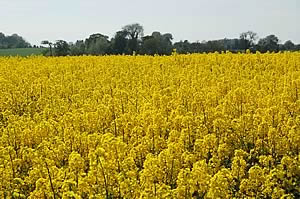 |
|||||||||
|
|||||||||||||||||||
Single
OSR Break Leaves Take-All Problems A single year of oilseed rape may not be a sufficient break to adequately safeguard first wheats from take-all, reveal the latest trials at Masstock Arable’s SMART Farm in Wellington, Somerset.
Over the past month serious patches of whiteheads have become apparent in all six feed wheat varieties in the field-scale trials drilled in late September following OSR after a previous wheat. And root inspections have pinpointed take-all as the primary cause. “Take-all is a fact of life in many of our second wheats
around here,” comments agronomist, Kevin Ashford of Agrownomics
responsible for the farm. “So we routinely use the specialist
seed treatment, Latitude (sithiofam) to keep it at bay. “All varieties established and developed well and, in view of the high residual nitrogen levels from past poultry manure applications, only needed 80 units of N as a liquid in May,” he reports. “We saw no stunting or other evidence of compromised rooting whatsoever. Until the middle of June, that was, when the hot dry weather started to take its toll and substantial patches of whiteheads developed throughout the crop. “We found some sharp eyespot on the stems, but no true eyespot;
and the lesions certainly weren’t serious. However, when
we dug up plants and found the classic blackened roots it became
obvious that take-all was the main culprit.” “Don’t think you can safely replace second wheat with
rape then go straight back into wheat without taking adequate precautions
against take-all,” he stresses. “You may get away with
it if you drill your first wheat late enough and have plenty of
summer moisture. But if you’ve had take-all problems in the
past you really need to take care. “In any event, do also think seriously about stem canker and other oilseed rape diseases if you’re considering the wheat/rape/wheat/rape rotations being advocated by some,” he concludes. “Our experience shows there are serious dangers of compromising OSR as well as cereal performance by tightening rotations too far.”
|
|||||||||||||||||||

|
|
||||||||||||||||||
| home | agri-services | pedigree
pen | news | dairy | beef | machinery property | organisations | site map |
|||||||||||||||||||
